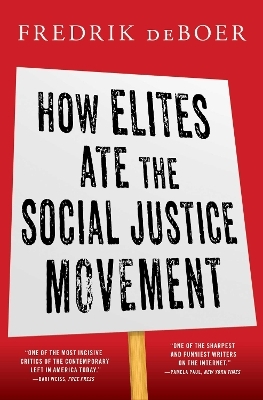
How Elites Ate the Social Justice Movement
Seiten
2024
Simon & Schuster (Verlag)
978-1-6680-1602-2 (ISBN)
Simon & Schuster (Verlag)
978-1-6680-1602-2 (ISBN)
In the wake of the murder of George Floyd, we asked for fundamental change. We got Goldman Sachs diversity pledges and rainbow flags flying in front of defense contractors.
An eye-opening exploration of American policy reform, or lack thereof, in the wake of the murder of George Floyd and the Black Lives Matter movement and how the country can do better in the future from Fredrik deBoer, “one of the sharpest and funniest writers on the internet” (The New York Times).
In 2020, while the Covid-19 pandemic raged, the United States was hit by a ripple of political discontent the likes of which had not been seen since the 1960s. The spark was the viral video of the horrific police murder of an unarmed Black man in Minneapolis. The killings of George Floyd galvanized a nation already reeling from Covid and a toxic political cycle. Tens of thousands poured into the streets to protest. Major corporations and large nonprofit groups—institutions that are usually resolutely apolitical—raced to join in. The fervor for racial justice intersected with the already simmering demands for change from the #MeToo movement and for economic justice from Gen Z. The entire country suddenly seemed to be roaring for change in one voice.
Then nothing much happened.
In How Elites Ate the Social Justice Movement, Fredrik deBoer explores why these passionate movements failed and how they could succeed in the future. In the digital age, social movements flare up but then lose steam through a lack of tangible goals, the inherent moderating effects of our established institutions and political parties, and the lack of any real grassroots movement in contemporary America. Hidden beneath the rhetoric of the oppressed and symbolism of the downtrodden lies and the inconvenient fact that those are doing the organizing, messaging, protesting, and campaigning are predominantly drawn from this country’s more upwardly mobile educated classes. Poses are more important than policies.
deBoer lays out an alternative vision for how society’s winners can contribute to social justice movements without taking them over, and how activists and their organizations can become more resistant to the influence of elites, nonprofits, corporations, and political parties. Only by organizing around class rather than empty gestures can we begin the hard work of changing minds and driving policy.
An eye-opening exploration of American policy reform, or lack thereof, in the wake of the murder of George Floyd and the Black Lives Matter movement and how the country can do better in the future from Fredrik deBoer, “one of the sharpest and funniest writers on the internet” (The New York Times).
In 2020, while the Covid-19 pandemic raged, the United States was hit by a ripple of political discontent the likes of which had not been seen since the 1960s. The spark was the viral video of the horrific police murder of an unarmed Black man in Minneapolis. The killings of George Floyd galvanized a nation already reeling from Covid and a toxic political cycle. Tens of thousands poured into the streets to protest. Major corporations and large nonprofit groups—institutions that are usually resolutely apolitical—raced to join in. The fervor for racial justice intersected with the already simmering demands for change from the #MeToo movement and for economic justice from Gen Z. The entire country suddenly seemed to be roaring for change in one voice.
Then nothing much happened.
In How Elites Ate the Social Justice Movement, Fredrik deBoer explores why these passionate movements failed and how they could succeed in the future. In the digital age, social movements flare up but then lose steam through a lack of tangible goals, the inherent moderating effects of our established institutions and political parties, and the lack of any real grassroots movement in contemporary America. Hidden beneath the rhetoric of the oppressed and symbolism of the downtrodden lies and the inconvenient fact that those are doing the organizing, messaging, protesting, and campaigning are predominantly drawn from this country’s more upwardly mobile educated classes. Poses are more important than policies.
deBoer lays out an alternative vision for how society’s winners can contribute to social justice movements without taking them over, and how activists and their organizations can become more resistant to the influence of elites, nonprofits, corporations, and political parties. Only by organizing around class rather than empty gestures can we begin the hard work of changing minds and driving policy.
Fredrik deBoer is the author of The Cult of Smart, a book about meritocracy, education, and the potential for a more humane society. It was selected by New York magazine as one of its Ten Best Books of 2020. He holds a PhD in English from Purdue University, where he concentrated on assessment of student learning. He lives in Brooklyn with his girlfriend and his cat Suavecito.
| Erscheinungsdatum | 06.09.2023 |
|---|---|
| Verlagsort | New York |
| Sprache | englisch |
| Maße | 140 x 213 mm |
| Gewicht | 195 g |
| Themenwelt | Geisteswissenschaften ► Geschichte ► Regional- / Ländergeschichte |
| Sozialwissenschaften ► Politik / Verwaltung ► Politische Systeme | |
| Sozialwissenschaften ► Politik / Verwaltung ► Politische Theorie | |
| ISBN-10 | 1-6680-1602-8 / 1668016028 |
| ISBN-13 | 978-1-6680-1602-2 / 9781668016022 |
| Zustand | Neuware |
| Informationen gemäß Produktsicherheitsverordnung (GPSR) | |
| Haben Sie eine Frage zum Produkt? |
Mehr entdecken
aus dem Bereich
aus dem Bereich
Erinnerungen
Buch | Softcover (2024)
Pantheon (Verlag)
CHF 22,40
Universalgelehrter, Polarreisender, Entdecker
Buch | Hardcover (2024)
mareverlag
CHF 39,20


